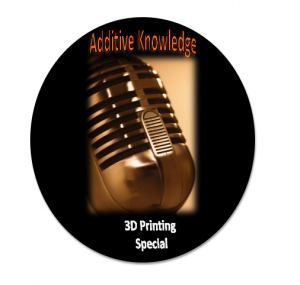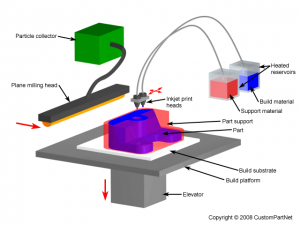Group Members: Andrew Graves, Matthew Plitt, Julia Brennan
This week on Additive Knowledge, we discuss several different applications of additive manufacturing. An interview with Dr. Albert Chi reveals one of the medical applications of 3D printing; child prosthetics can be made cheaply and efficiently through additive manufacturing. Afterwards, one of our journalists delivers a report on the negative consequences of additive manufacturing. The amazing precision that a 3D printer delivers, in conjunction with its ability to make objects out of plastic and metal, allows weapons to be easily fabricated by anyone who owns such a device. Listen in to gain some knowledge!


The intro is perfect. Not only does it bring about the idea of innovation in 3D printing, but it also brings about a possible ethical issue that gets the listener to stay tuned. It’s amazing to hear about just how cheap 3D Printed objects can be in comparison with today’s non3D-printed equivalents. 3D Printing has a big stake in the future and this podcast does a great job of letting the listener know that.
I like that this podcast pointed out both the benefits and the potential ethical problems with 3D printing. Custom prosthetics could revolutionize the prosthetic limb industry and help many people, but the same technology can also create unlicensed guns available to anyone with an internet connection and a 3D printer. This podcast informs the listener about the subject and begins a discussion on the ethics of 3D printing.
Very interesting to see that prosthetic limbs can be made cheaply with additive manufacturing. Also very interesting that unlicensed weapons can be manufactured with 3D printing which is a huge negative consequence. Overall very good podcast.
I really like the way you start your podcast by capturing the listener’s attention by your interesting proposal of being able to print your own objects and even guns. Very interesting subject that brings up many valid points about the possibly negative ethical and most likely positive financial effects of 3D printing. Well done!
The implications of 3D printers becoming cheaper, and more effective are very interesting. I wonder if 3D printed medical devices such prosthetics could easily be customized for the patient’s needs. I read about the 3D printed handgun; it was a very unreliable weapon and it is impossible to manufacture ammunition using a 3D printer, so unregulated weapons manufacturing seems to be impossible at least for now. Great podcast.
Isn’t it not too effective or practical to break off the support material by hand when it could easily done by a machine. Also, although 3D printing is very practical and helpful, you cannot disregard the danger involved with printing guns or other weapons… is there anyway to limit this from happening that your group had read about?
There are many types of 3d printers, and not all of them work the same way; while this podcast covers one process of 3d printing, I would’ve liked to see a few more types of 3d printing involved in description. However, the highlights of 3d printing have been made abundantly clear, as well as the problems. Well done.
I liked how you decided to narrow down your topic by choosing to talk about on one pro, and one con. It was an interesting choice to focus on the ethical opinions from the 3D printer instead of the scientific or manufacturing side, it made it very easy to follow, good job.
Amazing podcast! Detailed. Fun. Definitely worth listening to if a person that knows nothing about additive manufacturing is interested. I’m curious though as to the extreme capabilities of 3D. printing What would constrain building something massive, like a car? It’s been recently done, but it can’t be as simple as making a microfluidic chip in a lab. Just a question from my personal interest. Still, amazing work!
I really enjoyed the intro, it was creative and engaging. I thought the segment about helping children with birth defects was a prime example of how 3d printing can be of great benefit to society. I was also glad to hear about how 3d printers can be used to make firearms, I personally think this is one of the biggest issues with 3d printing becoming more popular.
3D printing sounds promising with many potential benefits. The legislation that needs to be set in place can cause a lot of obstacles for its progress. Do you know if there are any limitations regarding the composition of that being printed? Biomedical advancements would lead me to believe that that next step from prosthetic limbs would be 3D printed organs.
Good podcast! Alexander Zhang mentioned that it does not contain a lot of information about different types of 3d printers. I found this link useful – http://3dprintingfromscratch.com/common/types-of-3d-printers-or-3d-printing-technologies-overview/. It contains an overall overview of 6 popular 3d printers types.